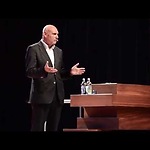When I was asked for my sustainability hero in class, a lot of different people came to mind. I thought of an innovator like Elon Musk from Tesla, or the artist Daan Roosegaarde, who came up with the ‘smart highway’ concept and the ‘smog vacuum cleaner’. I eventually went with Herman Wijffels, of whom I recently attended a Studium Generale talk. In this talk mister Wijffels explained his vision on the future of technology, society and economy.
One particular interesting idea to me was the idea that in the years to come, the economy will transition from a linear to a circular economy. A linear economy could be roughly described with the following process scheme: harvest, produce, consume, and discard. To transform this scheme into a circular scheme a feedback loop is introduced. Biological materials should still be harvested, produced and consumed, but instead of being discarded at the end of their life cycle, these materials should be used to enrich the natural environment. Technical materials, on the other hand, should be produced, used and than returned to the producer to be re-used. This may sound simple, but the transition has huge implications on how we will use and own our products. Devices and appliances like your washing machine, refrigerator, telephone, car, etc. will no longer be your property for instance. You will need to lease them from the manufacturer, use them, and at the end of their life cycle return them to the producer, to let them re-use the materials. This will be quite a transition for most people that are used to owning these kinds of devices as well as for the business models of the companies and the regulations involved. Mister Wijffels also expects that companies will again choose to produce on a more local scale in this kind of system, which will have implications on worldwide trading. The transition from a linear to a circular economy would be a very large-scale socio-technical transition as was described in class last week.
Although I did not fully agree with every notion of mister Wijffels, I was intrigued by this idea. Can we already introduce some of these notions in our case? At this stage the answer is probably no, but I will certainly keep it in the back of my mind during the work.
